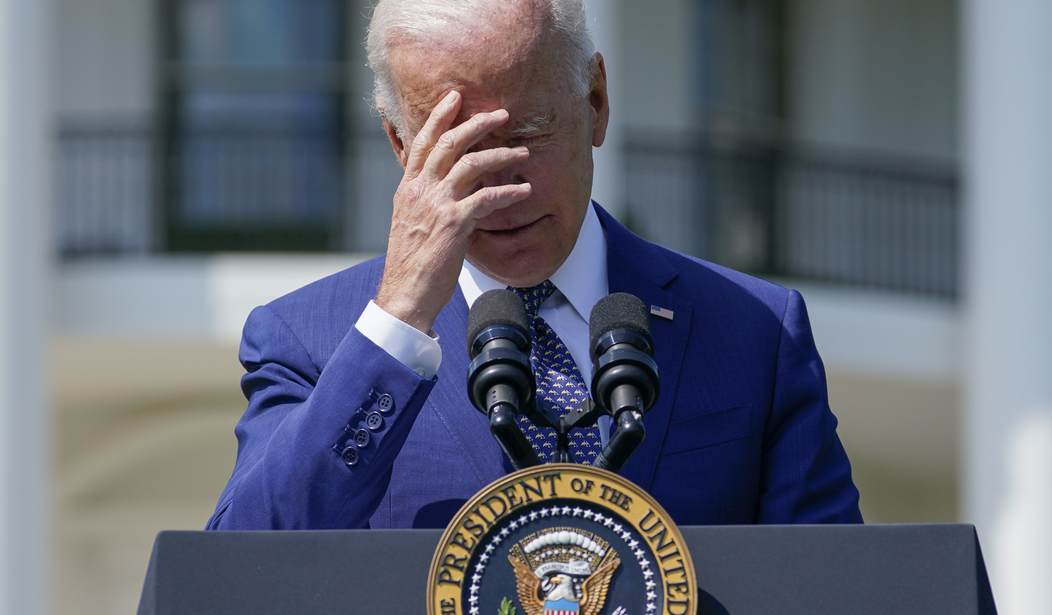Joe Biden’s RealClearPolitics average approval rating has been mostly underwater since August 20. However, over at famed pollster Nate Silver’s FiveThirtyEight, Biden’s average approval ratings remained in positive territory—albeit declining. How is this possible? FiveThirtyEight uses a different methodology than RealClearPolitics—which uses a straight average.
“How do we boil down dozens of approval-rating polls into a single number? It’s not a simple average!” explains Nathaniel Rakich of FiveThirtyEight. “We use an empirically tested, weighted average that accounts for poll quality and uncertainty.”
Just as RealClearPolitics’ average of Biden’s approval has been showing Biden’s approval declining steadily since he took office, FiveThirtyEight showed the same trend, though at a slower rate, so things looked better for Biden, even though his approval was definitely trending downward.
But on Tuesday, Biden’s FiveThirtyEight average finally went underwater, with 47.6 percent disapproving of his job performance and 47.2 approving.
Joe Biden is now underwater in the FiveThirtyEight weighted poll average. pic.twitter.com/jUtM15t0ay
— Matt Margolis (@mattmargolis) August 31, 2021
Just over a month ago, Biden’s net approval was +10 percentage points, while it now stands at -0.4 percentage points—a huge, rapid drop, clearly initiated by the botched Afghanistan withdrawal. On Monday, the Biden administration announced that evacuations were complete and the United States was leaving the country. For sure, Joe Biden hopes Americans’ attention will be focused elsewhere going forward. However, according to Geoffrey Skelley, Afghanistan isn’t the only issue haunting Joe Biden.
“There seem to be two separate events driving this rapid decline. First, Biden’s approval rating fell 2.5 points from July 26 to Aug. 5 as the delta variant surged,” Skelley wrote last week. “This slide is reflected in Biden’s overall handling of COVID-19, too. His approval rating on that issue fell about 3 points, from about 60 percent to 57 percent, after hovering in the low 60s for much of his presidency.”
Skelley believes, however, it is likely Biden’s approval ratings will bounce back eventually, because “polls conducted amid a high-profile event often show large shifts in opinion that then fade over time,” though he added that “Biden’s approval rating might fall a bit further before it reverts to any sort of mean.”
Still, other issues have been chipping away Biden’s approval for months now, and Biden’s ability to handle them is key. “What happens next in Afghanistan will be important for Biden’s approval rating, but equally important is whether Biden is able to navigate the other challenges facing him,” Skelley concludes.
What Skelley doesn’t account for, however, is that facing a crisis of competence so early in his presidency has undoubtedly spent much of Biden’s political capital—none of which he could afford to lose with razor-thin majorities in both Houses of Congress. While efforts to impeach or invoke the 25th Amendment will go nowhere, moderate and red-state Democrats will have a much easier time thwarting the radical left-wing agenda Biden has been trying to ram through, especially if the anticipated hostage crisis in Afghanistan plays out as experts and pundits predict it might, Biden’s ability to wield his political capital (and the bully pulpit that comes with it) will be damaged further.
Of course, the big revelation the latest polling data has shown is that Joe Biden has chinks in his armor. Given the increasingly partisan nature of presidential approval ratings, Biden’s approval may decline more, but not by much. The next few weeks will be critical for Biden as he hopes to change the subject away from Afghanistan. But with the anniversary of 9/11 coming up, it seems unlikely the wounds from the embarrassing defeat there will have healed by then.










